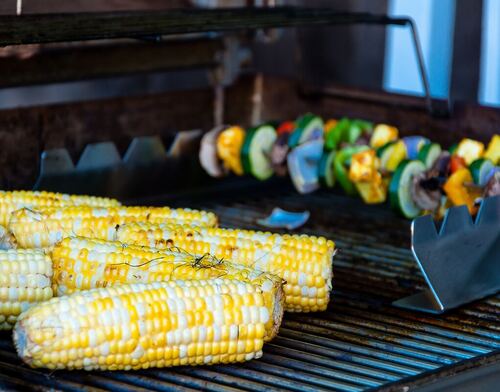Authored by Jesse Haas, CNS, LN
I was finishing my nutrition dietetics degree at the University of Minnesota when the headlines ruined summer: “Scientists Discover Grilling Causes Cancer.” What unfolded was actually even worse. Not only did this research ruin grilling, but frying, searing and roasting too.
Two compounds that damage DNA and may contribute to cancer are produced in the grilling process: heterocyclic amines (HCAs) and polyaromatic hydrocarbons (PAHs). That brown, crispy, deliciousness that develops when meat is charred contain HCAs. In animal studies, exposure to high amounts of HCAs caused cancer (1) (It should be noted that it took high exposure to cause cancer, however we are exposed to numerous compounds that are carcinogenic every day so our risk is not isolated to grilled foods alone. In my mind that warrants caution when faced with known carcinogens regardless of dose.). Frequent consumption of grilled meats will also increase risk (2).
PAHs are produced when fat drips off meat and onto the charcoal where it burns and recirculates as smoke, finally being deposited on the cooking food. Grilled meat consumption in general has been associated with increased risk of some cancers, including colon, breast, prostate and pancreas (1).
The good news is that when it comes to summer BBQs, you can have your grass-fed burger and eat it too, because there are some easy habits you can introduce that will reduce the production of both these compounds.
Summer in Minnesota is fleeting and magical, so don’t miss your chance to soak up the season and enjoy your favorite picnic fare because you fear the consequence. Instead grab one or two of these tips to power up your cancer-fighting defenses and chew with confidence.
*I am not affiliated with GrillGrates and do not financially benefit from the sale of their products.
References
Two compounds that damage DNA and may contribute to cancer are produced in the grilling process: heterocyclic amines (HCAs) and polyaromatic hydrocarbons (PAHs). That brown, crispy, deliciousness that develops when meat is charred contain HCAs. In animal studies, exposure to high amounts of HCAs caused cancer (1) (It should be noted that it took high exposure to cause cancer, however we are exposed to numerous compounds that are carcinogenic every day so our risk is not isolated to grilled foods alone. In my mind that warrants caution when faced with known carcinogens regardless of dose.). Frequent consumption of grilled meats will also increase risk (2).
PAHs are produced when fat drips off meat and onto the charcoal where it burns and recirculates as smoke, finally being deposited on the cooking food. Grilled meat consumption in general has been associated with increased risk of some cancers, including colon, breast, prostate and pancreas (1).
The good news is that when it comes to summer BBQs, you can have your grass-fed burger and eat it too, because there are some easy habits you can introduce that will reduce the production of both these compounds.
- Grill plants. I never tire of saying, “eat more vegetables!” This nutrition recommendation is true for everyone and good for everyone…and it makes a big difference in wellness. Worldwide, mortality from inadequate vegetable and fruit intake alone causes 2.6 million deaths (3). Simply eating 3 cups or more of vegetables every day reduces risk of hypertension and heart disease, stroke and some cancers. Fill two-thirds of your grill with veggies and you’re off to a good start!
Brassicas (my all-time favorite veggie family) might be the best companion to your grilled meats. Brassicas, include broccoli, cauliflower, cabbage, bok choy, radishes and much more. These veggies contain a sulfur-containing compound called sulforaphane, which has an antimutagenic effect that can neutralize the impact of HCAs on your DNA (2). Turns out that coleslaw has therapeutic effect! - Use GrillGrates: GrillGrates* are interlocking panels that sit on top of the grates that come with your grill. They heat up and sear/cook your food, while limiting the exposure it has to the flame underneath. You get the great grill flavoring and browning, while keeping PAH production to a minimum. Cooking in a cast iron skillet may also do the trick.
- Marinade. The acidic nature of vinegar helps break protein bonds that will produce HCAs on the grill. According to the University of Texas’ MD Anderson Cancer Center, marinating your meat in vinegar-based sauces for 30 minutes or longer before cooking can reduce HCA formation by as much as 96% (4).
- Add flavor…and antioxidants! Using herbs, like rosemary, thyme and sage can also have an impact on HCAs. Cancer and spice researcher, Bharat Aggarwal, PhD recommends bringing rosemary to your next backyard BBQ (5). Rosemary is an antioxidant powerhouse, which is probably how it combats HCA production (which is an oxidative process). Not only can you season your food with this potent herb, but throwing a sprig on the coals may even have benefit.
Fruits can also lower HCA production. Sour cherries are the most effective, but plums and apples have also been found to be beneficial…and delicious (2)! Try mixing chopped cherries into free-range turkey burgers or pureeing them with apple cider vinegar and thyme for a marinade. - Lower the heat. Higher temperatures and longer cooking times increase HCA production (2). To mitigate this, while maintaining that grilled deliciousness, par-cook your meats in the crockpot or oven, then transfer to the grill to finish. Flipping your burgers or wings frequently also keeps the temperature on the meat lower and reduces HCA production (2).
Summer in Minnesota is fleeting and magical, so don’t miss your chance to soak up the season and enjoy your favorite picnic fare because you fear the consequence. Instead grab one or two of these tips to power up your cancer-fighting defenses and chew with confidence.
*I am not affiliated with GrillGrates and do not financially benefit from the sale of their products.
References
- Chemicals in meat cooked at high temperatures and cancer risk. National Cancer Institute.
- Schor, J. (2010). Marinades reduce heterocyclic amines from primitive food preparation techniques. Natural Medicine Journal; 2(7).
- Lock, K., Pomerleau, J., Causer, L., Altmann, D., McKee, M. (2005). The global burden of disease attributable to low consumption of fruit and vegetables: implications for the global strategy on diet. Bulletin of the World Health Organization; 83(2).
- Keep cancer off the BBQ grill (2011). MD Anderson Cancer Center.
- Aggarwal, B., Yost, D. (2011). Healing Spices: How to use 50 everyday and exotic spices to boost health and beat disease. New York, New York. Sterling
| Jesse Haas, CNS, LN is a licensed functional nutritionist and certified health coach. She was a founding partner of Wellness Minneapolis and was an active practitioner with the clinic from 2014-2022. To connect with her regarding functional nutrition and health coaching services, please follow this link. |



 RSS Feed
RSS Feed